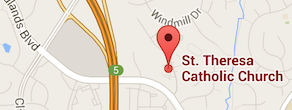Can a Catholic Marry a Non-Catholic?
Can A Catholic Marry a Non-Catholic?
Although the answer to this week’s question may seem obvious, there are many people who wonder—may I marry a non-Catholic and still be married in the Catholic Church? The answer is “yes, so long as you do so with the assistance of your parish priest from the beginning.”
Catholic/non-Catholic weddings are called mixed marriages. These fall into two categories:
- Sacramental Marriage: If a Catholic marries a baptized person who is not Catholic—such as an Episcopalian, Presbyterian, or Baptist—the wedding is a sacrament.
- Non-Sacramental Marriage: If a Catholic marries a person who is not baptized—such as a Hindu, Jew, or Muslim—the wedding is not a sacrament.
Why the difference? Remember last week when I wrote that the couple themselves (and not the priest) are the celebrants of the Sacrament of Matrimony? The difference lies in the fact that a non-baptized person receives his first sacrament… at Baptism! Only after Baptism can a person receive another sacrament, whether that is Eucharist, Confirmation, or Matrimony. Since both persons give and receive Matrimony, it cannot be a sacrament for one person only.
What should I do if I want to marry a non-Catholic? The answer is simple—call the priest first. The priest needs to do three things:
- For any mixed marriage in the Catholic Church, the priest must receive a special dispensation, in writing, from the bishop.
- This dispensation is always given so long as the Catholic has agreed to keep practicing the Catholic faith, and has promised to raise their children as Catholics. The priest must secure this promise in good will.
- The priest must meet with the couple to help them understand the spiritual importance of Matrimony. This is often called “Pre-Cana,” although that’s an unofficial term.
If a Catholic marries a non-Catholic, the wedding is usually not a Mass. This is to avoid the difficulty of so many persons being unable to receive the Eucharist. Of course, the wedding can be a Mass (as it was in the case of my sister’s wedding) but most often it is not. The ordinary place of a mixed marriage is the parish church, and the ordinary presider is the priest. A non-Catholic minister may attend the marriage ceremony and may also address, pray with, and bless the couple.
What many do not realize is that a bishop can permit a mixed marriage to take place in a non-Catholic church with a non-Catholic minister as the officiating witness. Also, a Catholic priest may attend such a ceremony and may address, pray with, and bless the couple. To avoid any confusion or misunderstanding, it is good manners, whenever this happens, to inform the Catholic guests that the wedding ceremony is approved and blessed by the Catholic Church.
In all cases, the Catholic Church tries its best to accommodate mixed marriages and to bless them. They have been the source of countless blessings for many lives, including my own! I had only one Catholic great-grandparent—from County Sligo, Ireland. She married an Anglican from Yorkshire, England. Her daughter (my grandmother) married a choir-singing Methodist from Matthew’s County, Virginia. Her daughter (my mother) married my father, from the United Church of Christ of Akron, Ohio. And from all those mixed marriages came—your Pastor, who once again says
God bless you, and St. Theresa pray for us!
Fr. Hudgins
